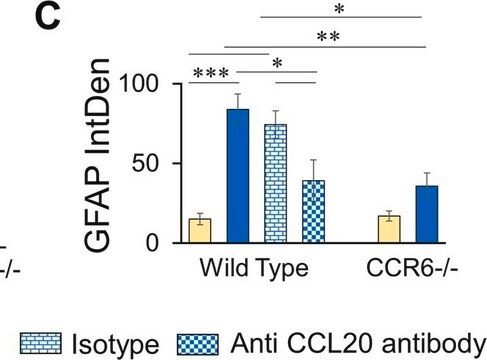AB5022
Anti-Taurine (No Gluteraldehyde) Antibody
diluted serum, Chemicon®
About This Item
Produits recommandés
Source biologique
rabbit
Niveau de qualité
Forme d'anticorps
diluted serum
Type de produit anticorps
primary antibodies
Clone
polyclonal
Espèces réactives
vertebrates
Fabricant/nom de marque
Chemicon®
Technique(s)
immunohistochemistry: suitable
Conditions d'expédition
wet ice
Modification post-traductionnelle de la cible
unmodified
Catégories apparentées
Spécificité
Immunogène
Application
*This antibody has also been used and found to work with a zero-low glutaraldehyde / high paraformaldehyde fixation (4% paraformaldehyde in 0.1M phosphate buffer / 3% sucrose fixative ). The minimum glutaraldehyde concentration for AB5022 is 0.00%. See protocol that follows. Performance is good with frozen sections, Vibratome sections and tissue culture formats, when penetrating reagents such as 0.3% Triton X-100 are used.
Optimal working dilutions must be determined by the end user.
DILUTION: Prepare enough of the AB5022 for your days use by diluting 100X with 1% GSPBT.
Forme physique
Informations légales
Vous ne trouvez pas le bon produit ?
Essayez notre Outil de sélection de produits.
Mentions de danger
Conseils de prudence
Classification des risques
Aquatic Chronic 3
Code de la classe de stockage
12 - Non Combustible Liquids
Classe de danger pour l'eau (WGK)
WGK 2
Point d'éclair (°C)
Not applicable
Certificats d'analyse (COA)
Recherchez un Certificats d'analyse (COA) en saisissant le numéro de lot du produit. Les numéros de lot figurent sur l'étiquette du produit après les mots "Lot" ou "Batch".
Déjà en possession de ce produit ?
Retrouvez la documentation relative aux produits que vous avez récemment achetés dans la Bibliothèque de documents.
Notre équipe de scientifiques dispose d'une expérience dans tous les secteurs de la recherche, notamment en sciences de la vie, science des matériaux, synthèse chimique, chromatographie, analyse et dans de nombreux autres domaines..
Contacter notre Service technique








